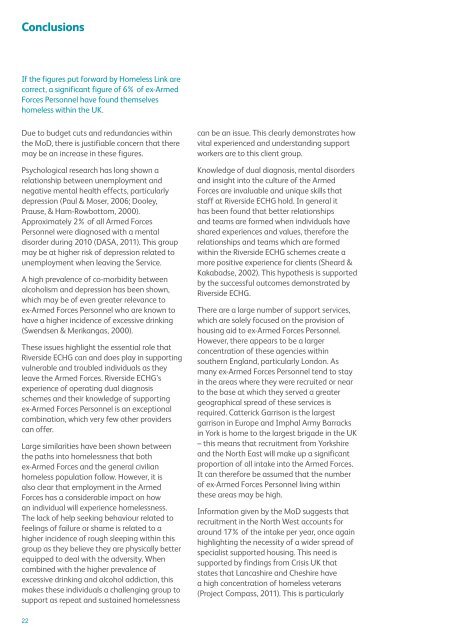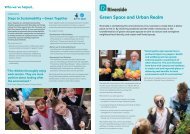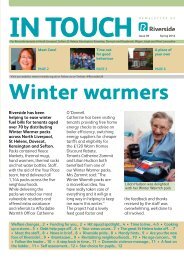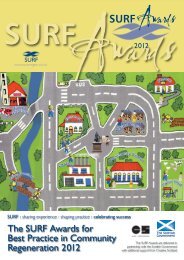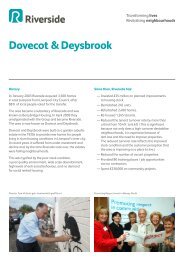Homelessness within ex-Armed Forces Personnel - Riverside
Homelessness within ex-Armed Forces Personnel - Riverside
Homelessness within ex-Armed Forces Personnel - Riverside
Create successful ePaper yourself
Turn your PDF publications into a flip-book with our unique Google optimized e-Paper software.
Conclusions<br />
If the figures put forward by Homeless Link are<br />
correct, a significant figure of 6% of <strong>ex</strong>-<strong>Armed</strong><br />
<strong>Forces</strong> <strong>Personnel</strong> have found themselves<br />
homeless <strong>within</strong> the UK.<br />
Due to budget cuts and redundancies <strong>within</strong><br />
the MoD, there is justifiable concern that there<br />
may be an increase in these figures.<br />
Psychological research has long shown a<br />
relationship between unemployment and<br />
negative mental health effects, particularly<br />
depression (Paul & Moser, 2006; Dooley,<br />
Prause, & Ham-Rowbottom, 2000).<br />
Approximately 2% of all <strong>Armed</strong> <strong>Forces</strong><br />
<strong>Personnel</strong> were diagnosed with a mental<br />
disorder during 2010 (DASA, 2011). This group<br />
may be at higher risk of depression related to<br />
unemployment when leaving the Service.<br />
A high prevalence of co-morbidity between<br />
alcoholism and depression has been shown,<br />
which may be of even greater relevance to<br />
<strong>ex</strong>-<strong>Armed</strong> <strong>Forces</strong> <strong>Personnel</strong> who are known to<br />
have a higher incidence of <strong>ex</strong>cessive drinking<br />
(Swendsen & Merikangas, 2000).<br />
These issues highlight the essential role that<br />
<strong>Riverside</strong> ECHG can and does play in supporting<br />
vulnerable and troubled individuals as they<br />
leave the <strong>Armed</strong> <strong>Forces</strong>. <strong>Riverside</strong> ECHG’s<br />
<strong>ex</strong>perience of operating dual diagnosis<br />
schemes and their knowledge of supporting<br />
<strong>ex</strong>-<strong>Armed</strong> <strong>Forces</strong> <strong>Personnel</strong> is an <strong>ex</strong>ceptional<br />
combination, which very few other providers<br />
can offer.<br />
Large similarities have been shown between<br />
the paths into homelessness that both<br />
<strong>ex</strong>-<strong>Armed</strong> <strong>Forces</strong> and the general civilian<br />
homeless population follow. However, it is<br />
also clear that employment in the <strong>Armed</strong><br />
<strong>Forces</strong> has a considerable impact on how<br />
an individual will <strong>ex</strong>perience homelessness.<br />
The lack of help seeking behaviour related to<br />
feelings of failure or shame is related to a<br />
higher incidence of rough sleeping <strong>within</strong> this<br />
group as they believe they are physically better<br />
equipped to deal with the adversity. When<br />
combined with the higher prevalence of<br />
<strong>ex</strong>cessive drinking and alcohol addiction, this<br />
makes these individuals a challenging group to<br />
support as repeat and sustained homelessness<br />
can be an issue. This clearly demonstrates how<br />
vital <strong>ex</strong>perienced and understanding support<br />
workers are to this client group.<br />
Knowledge of dual diagnosis, mental disorders<br />
and insight into the culture of the <strong>Armed</strong><br />
<strong>Forces</strong> are invaluable and unique skills that<br />
staff at <strong>Riverside</strong> ECHG hold. In general it<br />
has been found that better relationships<br />
and teams are formed when individuals have<br />
shared <strong>ex</strong>periences and values, therefore the<br />
relationships and teams which are formed<br />
<strong>within</strong> the <strong>Riverside</strong> ECHG schemes create a<br />
more positive <strong>ex</strong>perience for clients (Sheard &<br />
Kakabadse, 2002). This hypothesis is supported<br />
by the successful outcomes demonstrated by<br />
<strong>Riverside</strong> ECHG.<br />
There are a large number of support services,<br />
which are solely focused on the provision of<br />
housing aid to <strong>ex</strong>-<strong>Armed</strong> <strong>Forces</strong> <strong>Personnel</strong>.<br />
However, there appears to be a larger<br />
concentration of these agencies <strong>within</strong><br />
southern England, particularly London. As<br />
many <strong>ex</strong>-<strong>Armed</strong> <strong>Forces</strong> <strong>Personnel</strong> tend to stay<br />
in the areas where they were recruited or near<br />
to the base at which they served a greater<br />
geographical spread of these services is<br />
required. Catterick Garrison is the largest<br />
garrison in Europe and Imphal Army Barracks<br />
in York is home to the largest brigade in the UK<br />
– this means that recruitment from Yorkshire<br />
and the North East will make up a significant<br />
proportion of all intake into the <strong>Armed</strong> <strong>Forces</strong>.<br />
It can therefore be assumed that the number<br />
of <strong>ex</strong>-<strong>Armed</strong> <strong>Forces</strong> <strong>Personnel</strong> living <strong>within</strong><br />
these areas may be high.<br />
Information given by the MoD suggests that<br />
recruitment in the North West accounts for<br />
around 17% of the intake per year, once again<br />
highlighting the necessity of a wider spread of<br />
specialist supported housing. This need is<br />
supported by findings from Crisis UK that<br />
states that Lancashire and Cheshire have<br />
a high concentration of homeless veterans<br />
(Project Compass, 2011). This is particularly<br />
relevant in the North West where, despite<br />
social housing being available to <strong>ex</strong>-<strong>Armed</strong><br />
<strong>Forces</strong> <strong>Personnel</strong>, there is little in the way of<br />
the specialist supported housing that is clearly<br />
needed to enable individuals to gain<br />
psychological health and life skills. <strong>Riverside</strong><br />
ECHG has housing stock in this area, which<br />
could be utilised for this purpose.<br />
In addition to a wider geographical spread<br />
of supported housing for <strong>ex</strong>-<strong>Armed</strong> <strong>Forces</strong><br />
<strong>Personnel</strong> a lack of co-ordination between<br />
resources has been noted. There are many<br />
organisations attempting to bring together all<br />
the services working with this client group, but<br />
there is no one body that can be seen as a<br />
figure head. A co-ordinated approach, similar<br />
to that of Veterans of Scotland, is needed and<br />
should be a priority for organisations that offer<br />
support to veterans. This system would ensure<br />
that clients only need to fill in one form to<br />
request supported housing and this form is<br />
then passed on to all the necessary<br />
associations (in effect SPACES already do this).<br />
This would simplify the process for already<br />
confused and chaotic clients and may be a<br />
positive step in reducing the number who<br />
return to rough sleeping.<br />
The outcomes reported, supported by the case<br />
studies, clearly demonstrate the value of the<br />
supported housing services which <strong>Riverside</strong><br />
ECHG provide to <strong>ex</strong>-<strong>Armed</strong> <strong>Forces</strong> <strong>Personnel</strong>.<br />
Without this provision many of the vulnerable<br />
individuals who are not based in London or<br />
Southern England would have few local<br />
resources available to offer them support.<br />
More information<br />
This report was researched and written by<br />
Caroline Kilkenny. If you’d like to find out<br />
more information please contact her on:<br />
caroline.kilkenny@riverside.org.uk<br />
01482 351119<br />
22 23


